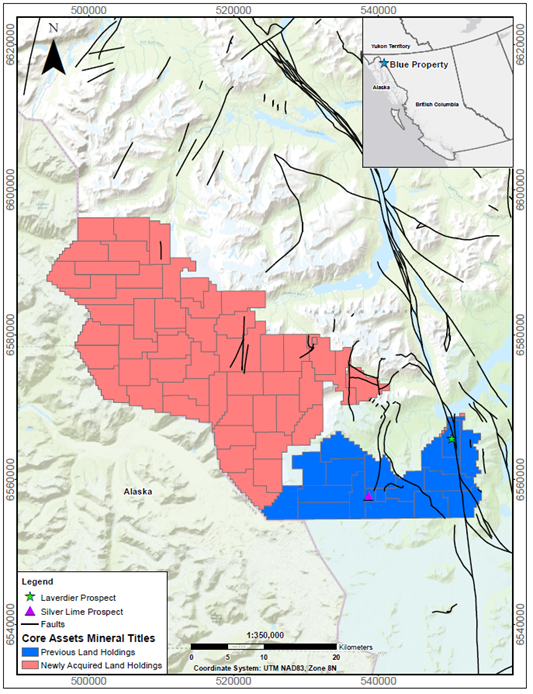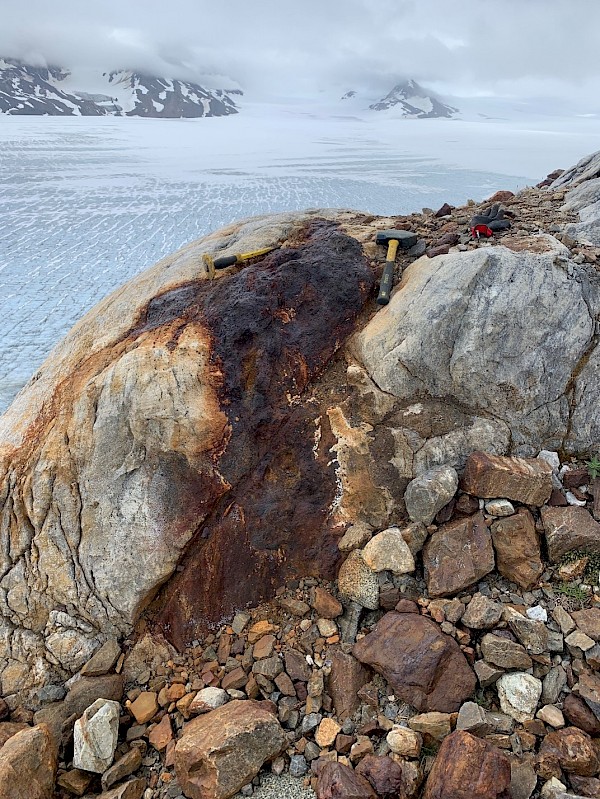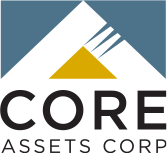Vancouver, September 20th, 2021 – Core Assets Corp., (“Core Assets” or the “Company”) (CSE:CC) (Frankfurt: 5RJ WKN:A2QCCU) (OTCQB:CCOOF) is pleased to announce that it has increased its mineral claim holdings by staking at the Blue Property (the “Property”) located in the Atlin Mining District of British Columbia.
Highlights
• As a result of encouraging visual observations (see Figure 2 below of classic carbonate replacement mineralization seen at the Property) during phase one and two exploration programs, Core Assets decided to increase its land package substantially from 26,080 ha (~260.8 km²) to 108,337 ha (~1,083 km²) (see Figure 1 below for map) making it one of the largest mineral claim holders in the Atlin Mining Camp.
• Core Assets technical team has determined that much of the newly receded glaciated terrain of southwest Atlin Lake is virtually unexplored and government mapped limestone bodies (the favourable host for carbonate replacement mineralization) are far more extensive in the area than mapped in the 1950’s.
• Field observations have determined that the permeability and porosity of the limestone bodies in the area are favourable for allowing transportation of mineralized carbonate replacement fluids.
• The CRD-Porphyry exploration model that is guiding Core Assets exploration plan has seen incremental advancements in understanding globally since the last exploration campaigns of the 1980’s. Core’s technical team has leveraged its knowledge of this in an area of newly deglaciated terrain where there is no documented historical exploration.
• Results from the phase one sampling program are expected by late September 2021. Samples from the phase one program of presumed altered granitic rocks surrounding the carbonate replacement mineralization have been submitted to a lab for petrographic analysis and are expected to be returned later this year.
Core Assets’ President and CEO Nick Rodway comments, "It’s very common for multiple carbonate replacement style deposits to form along vast amounts of land straddling the Pacific Western margins of North, Central and South America. Based upon preliminary visual observations of mineralization at the property, we decided to consolidate the areas of newly exposed bedrock and turn Core Assets into a district scale explorer of the prolific Atlin Mining District.”

Figure 1: Map showing increased land package at the Blue Property

Figure 2: Photo of classic carbonate replacement mineralization seen at the Blue Property near glacier edge. Core Assets has now delineated more than 100 massive sulfide occurrences on the property. The CRD-Porphyry model suggests that all mineralization could potentially be linked in the subsurface and continuous all the way back to the source (Sample 152331).
About the Expansion of the Blue Property
As a result of encouraging visual field observations (see photo of classic example of CRD mineralization at the Property above) during phase one and two exploration programs, Core Assets decided to increase its land package substantially from 26,080 ha (~260.8 km²) to 108,337 ha (~1,083 km²) making it one of the largest mineral claim holders in the Atlin Mining Camp (see Figure 1 area map above). Core Assets technical team has determined that much of the newly receded glaciers of southwest Atlin Lake are virtually unexplored and the Geological Society of Canada mapped limestone bodies (the favourable host for carbonate replacement mineralization) are determined to be far more extensive in the area then mapped in the 1950’s. Observations made by Core Assets’ technical team have determined that the permeability and porosity of the limestone bodies in the area are favourable for allowing transportation of mineralized carbonate replacement fluids to surface.
The CRD-Porphyry exploration model that is guiding Core Assets exploration plan wasn’t developed until after the last exploration campaigns on the east side of the Property and this model has seen incremental advancements and success since the last exploration campaigns of the 1980’s. Core’s technical team has leveraged its “boots on the ground” interpretations in areas of newly exposed bedrock where there is no documented historical exploration to increase its potential for multiple discoveries.
Core Assets expects to have results from its phase one sampling program in late September 2021. During the phase one program, the Core Assets team also collected 18 samples of altered granitic rock units to prepare for petrography. The samples will be cut into thin sections and analysed at a lab under a petrographic microscope to determine alteration assemblages. This will help Core Assets vector towards a potential porphyry source, which may be responsible for the significant surficial mineralization seen at surface. The analysis results are expected to be returned later this year.
About the Blue Property
The Blue Property consists of two main historical high grade mineral prospects (‘Laverdiere’ and ‘Silver Lime’) in a total contiguous land package of approximately 108,337 ha (~1,083 km²). The project is located 48 km southwest of the town of Atlin, British Columbia. In 2018, the Company sent a geological team to the Blue Property for preliminary surface sampling. Three areas of skarn exposure with massive and disseminated sulfide were observed along the western side of the Llewellyn Fault Zone, known as the Laverdiere Prospect. A total of 28 grab samples were collected and sent for analysis with values of up to 8.46% copper, 1.57 g/t gold and 46.5 g/t silver reported.
The Silver Lime Prospect is located just 10 km southwest of the Laverdiere Prospect, and encompasses two significant historical mineral occurrences, the Falcon and Jackie showings. The Falcon showing was discovered by Carmac Resources in 1990 and consists of several northwest trending limestone beds and the Jackie showing consists of a series of altered quartz veins. Mineralization often consists of galena, sphalerite, pyrite, chalcopyrite, arsenopyrite and stibnite. The system is exposed in multiple areas on the property with one more significant outcrop that is visible for 25 metres with strike extensions covered by talus. Individual mineralization can be seen up to 2.2 metres wide. To the northwest, a quartz-feldspar porphyry breccia contains smaller quartz veins with semi-massive arsenopyrite and stibnite. Sample 88339 taken from a 2.20 metre vein system assayed 3.3 g/t gold, 2,641 g/t silver, 0.15% copper, 2.5% lead and 3.32% zinc, 5.0% arsenic and 2.56% antimony (ARIS 21162*).
In 2018, Zimtu Capital Corp., as part of a helicopter reconnaissance program, prospected the Silver Lime Prospect and collected 8 samples. The results confirmed the historic work of Carmac (1990), having returned values of 1.16 g/t gold, 913 g/t silver, 12.45% zinc and >20.0% lead.
The Silver Lime Prospect has the potential to represent a carbonate replacement deposit model (CRD). Massive sulphide mineralization occurs in limestone and biotite-muscovite-sericite schists near the contacts between the units. Large zones of limonite alteration, cut by alaskite and hornblende porphyry dikes, surround these occurrences. The lenses appear to be widest near the porphyry dikes. Several faults follow the general direction of the dikes, suggesting structural control on the mineralization. Sulphides at the Jackie showing often comprise galena, sphalerite, chalcopyrite, pyrrhotite and pyrite. The mineralization can be up to 30 metres long and 6 metres wide. The smaller occurrences host sphalerite and galena mineralization and the larger occurrences vary mineralogically along length. Galena, quartz and calcite dominate the northwest changing to pyrrhotite, chalcopyrite and pyrite in the centre and border areas (Minfile 104M 031*).
The 2021 prospecting and sampling programs have focused on resampling the Silver Lime Prospect and evaluating the newly staked ground by Core Assets Corp. to the west of the prospect to better understand how the mineralization is zoned with regards to the source. (See news release dated June 11, 2021).
National Instrument 43-101 Disclosure
Nicholas Rodway, P.Geo, (Licence # 46541) is President, CEO and Director of the Company, and qualified person as defined by National Instrument 43-101. Mr. Rodway supervised the preparation of the technical information in this news release.
*Historical technical numbers are not compliant with NI 43-101 and are provided as an indication that mineralization is present. Historical information is relied on by the Company only as encouraging further exploration and assessment of the properties. All references listed under Minfile and ARIS can be found at the following British Columbia database links:
Minfile: https://minfile.gov.bc.ca/searchbasic.aspx
ARIS: https://aris.empr.gov.bc.ca/
About Core Assets Corp.
Core Assets Corp. is a Canadian mineral exploration company focused on the acquisition and development of mineral projects in British Columbia., Canada. The company currently holds 100% title ownership in the Blue Property, that covers a land area of ~108,337 ha (~1,083 km²). The project lies within the Atlin Mining District, a well-known gold mining camp. The Property hosts a major structural feature known as The Llewellyn Fault Zone (“LFZ”). This structure is approximately 140 km in length and runs from the Yukon border down through the property to the Alaskan Panhandle Juneau Ice Sheet in the United States. Core Assets believes that the south Atlin Lake area and the LFZ has been neglected since the last major exploration campaigns in the 1980's. The LFZ plays an important role in mineralization of near surface metal occurrences across the property. The past 50 years have seen substantial advancements in the understanding of porphyry, skarn, and carbonate replacement type deposits both globally and in BC’s Golden Triangle. The company has leveraged this information at the Blue Property to tailor an already proven exploration model and believes this could facilitate a major discovery. Core Assets is excited to become one of Atlin Mining District’s premier explorers where its team believes there are substantial opportunities for new discoveries and development in the area.
On Behalf of the Board of Directors
CORE ASSETS CORP.
“Nicholas Rodway”
President & CEO
Tel: 604.681.1568
Neither the Canadian Securities Exchange nor its Regulation Services Provider (as that term is defined in the policies of the CSE) accepts responsibility for the adequacy or accuracy of this release.
FORWARD LOOKING STATEMENTS
Statements in this document which are not purely historical are forward-looking statements, including any statements regarding beliefs, plans, expectations, or intentions regarding the future. Forward looking statements in this news release include the goals and scope; that the limestone bodies in the area are favourable for allowing transportation of mineralized carbonate replacement fluids; that Core expects to have results from its phase one sampling program in late September 2021; that we can become a district scale explorer; that Core Assets will drill in 2022; that the Blue Property has substantial opportunities for a discovery and development; that work on the Blue Property could potentially lead to a new porphyry/CRD style discovery; and that there may be a commercially viable gold or other mineral deposit on our claims. It is important to note that the Company's actual business outcomes and exploration results could differ materially from those in such forward-looking statements. Risks and uncertainties include that further permits may not be granted timely or at all; the mineral claims may prove to be unworthy of further expenditure; there may not be an economic mineral resource; methods we thought would be effective may not prove to be in practice or on our claims; economic, competitive, governmental, environmental and technological factors may affect the Company's operations, markets, products and prices; our specific plans and timing drilling, field work and other plans may change; we may not have access to or be able to develop any minerals because of cost factors, type of terrain, or availability of equipment and technology; and we may also not raise sufficient funds to carry out our plans. Additional risk factors are discussed in the section entitled "Risk Factors" in the Company's Management Discussion and Analysis for its recently completed fiscal period, which is available under Company's SEDAR profile at www.sedar.com. Except as required by law, we will not update these forward looking statement risk factors.
